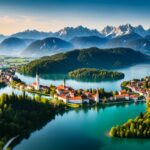”SMART ENERGY INNOVATIONS AND PARTNERSHIPS BETWEEN EUROPE AND AFRICA”
Africa’s energy landscape is evolving tropically, with the continent poised to lead the world in sustainable energy growth Europe is creating innovations in smart energy technologies that could support Africa’s transition to clean and efficient energy solutions, knowledge and technology sharing
Slovenia, in particular, has proven itself to be a country where the green transition is progressing well. Slovenia’s approach to energy efficiency and renewable energy can serve as a valuable model for African nations, regional nations and Europe as a whole looking to enhance their energy sectors

ENERGIZING AFRICA, A PLATFORM TO POWER PARTNERSHIP &. FUEL PROGRESS.
Slovenia aligns with the EU Green Deal, advancing sustainability and climate neutrality, inspiring African nations.
Global efforts focus on transitioning to sustainable energy, enhancing efficiency, and expanding renewable access by 2030.
Global efforts focus on renewable energy, efficiency, and access, aligning with SDG 7 and Paris Agreement goals.
Energizing Africa fosters Africa-Europe collaboration, renewable innovation, sustainable investments, and partnerships for energy access and sustainability.
Following the EU Green Deal which aims to make the EU carbon-neutral by 2050, transforming its economy And society for a sustainable future. It addresses sectors like energy, agriculture, and transportation, focusing on climate change, biodiversity, and pollution reduction, Slovenia has adopted key initiatives to achieve the Green Deal’s goal, including cutting emissions by 55% by 2030 and reaching climate neutrality by 2050 Slovenia’s efforts, such as energy sector regulation, increased investments, and support for sustainable energy efficiency. Slovenia, despite its small size, has proven itself on the international stage and has led the way in several global initiatives. It is a key player that can serve as a bridge between the EU and Africa to advance the EU’s global agenda.
At the global level, there is growing recognition of the urgent need to transition to sustainable energy systems reflected in the United Nations Sustainable Development Goal (SDG) 7. Which aims for universal access to affordable, reliable, and sustainable energy by 2030. Key targets include increasing the share of renewable energy. Improving energy efficiency, and expanding energy access This agenda aligns with the Paris Agreement to limit global warming, as the energy sector is responsible for the majority of greenhouse gas emissions. Key actions include transitioning to renewable energy, boosting efficiency, and reducing fossil fuel subsidies.
Africa faces unique energy challenges but also immense opportunities in the shift towards sustainable energy.
The African Union’s Agenda 2063 includes specific objectives for sustainable development, including boosting the share of renewable energy. Several African countries have set ambitious targets for increasing renewable energy capacity, with a particular focus on solar, wind, and hydroelectric power, given the continent’s vast natural resources. Africa’s Renewable Energy Initiative (AREL), launched under the African Union, aims to achieve at least 300 GW of renewable energy capacity by 2030. This initiative seeks to transform Africa’s energy landscape by focusing on decentralized energy systems, off-grid solutions, and providing universal access to clean energy.
The SDG7 Initiative for Africa by the The Economic Commission for Africa (ECA), targets universal access To electricity by 2030, addressing the energy deficit that leaves over 600 million people without power. The African Development Bank (ADB) has been instrumental in supporting this transition, with initiatives like the desert to Power Initiative, which aims to homes solar power across the Sahel region to provide energy to millions. The continent’s energy future is also being shaped by regional collaborations, such as the East African Power Pool (EAPP) and the West African Power Pool (WAPP), which focus on integrating energy markets and expanding renewable energy. South Africa’s Integrated Resource Plan (IRP) and Kenya’s Least Cost Power Development Plan (LCPDP), Renewable Energy and Energy Efficiency for Central Africa (CEREEAC), and many more are examples of national-level efforts to incorporate sustainable energy into their energy mix.
Twice a year, a group of interesting and impactful people gathers for the week-long experience — which attendees have described as “the ultimate brain spa” and “a journey into the future in the company.”
Energizing Africa conference and Exhibition foster collaboration between Africa and Europe, with a particular emphasis on new innovations and technologies, sustainable investment, intellectual property rights that can help accelerate energy access and sustainability while protecting our environment. Connecting African and European Expert in Renewable energy, addressing key issues, challenges, and opportunities within the renewable energy sector, while also issuing a call to action for international organizations, governments NGOs, and other stakeholders to cooperate on sustainable energy solutions. Creating a platform for partnerships between European and African companies in the renewable energy sector.
